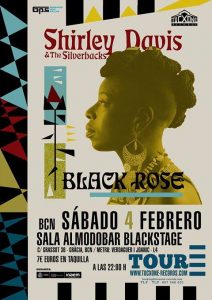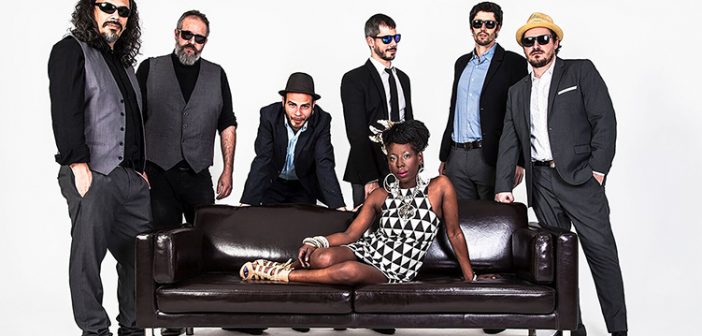 Shirley Davis is a beautiful contradiction. Accessible, yet mesmerising, with advice you might hear both from your best friend and the wisest souls on the planet, she speaks with refreshing energy of plans for the future, and why Spain (and Europe) is her next challenge. Interviewing as the most approachable and relaxed woman in a hundred mile radius, you might be mistaken for thinking Shirley Davis is a softie. Just wait for her to explain her plans for musical world domination, and the strength that is so palpable in Davis’ music becomes apparent. After having started her career in Australia, Shirley relocated to Madrid to work with The Silverbacks blues band to write the album Black Rose. Ahead of her concert on the 4th of February at the Sala Almodovar in Barcelona, Barcelona Connect ’s Alexandra speaks to Shirley to find out more about what lies behind her motivation.
Shirley Davis is a beautiful contradiction. Accessible, yet mesmerising, with advice you might hear both from your best friend and the wisest souls on the planet, she speaks with refreshing energy of plans for the future, and why Spain (and Europe) is her next challenge. Interviewing as the most approachable and relaxed woman in a hundred mile radius, you might be mistaken for thinking Shirley Davis is a softie. Just wait for her to explain her plans for musical world domination, and the strength that is so palpable in Davis’ music becomes apparent. After having started her career in Australia, Shirley relocated to Madrid to work with The Silverbacks blues band to write the album Black Rose. Ahead of her concert on the 4th of February at the Sala Almodovar in Barcelona, Barcelona Connect ’s Alexandra speaks to Shirley to find out more about what lies behind her motivation.
How did you get into music? And more specifically how did you get into soul?
When I was about 22 and I had my daughter, I was experimenting with what I wanted to do in my life. My daughter was my biggest prize. I was having coffee with my friend one day and she asked me what I wanted to do with my life. She was asking me this question so I could lock in with myself and do something; I was a married woman and I had the right to work or stay at home and be a stay at home mum, but she wanted me to do something with my life and asked me what it was I really wanted to do. And I said….well…what I love to do is to sing. So she asked me to sing something for her, which I did, and then she picked up the phone and sent me to audition for a classic soul band. It was as if as soon as I had made the decision there was a follow through: I auditioned, got the job. I was the baby in the band. No singing lessons, nothing. From the moment I had made that choice, there was something for me to do – a place for me – in this industry. I worked a lot with this band. We toured, we supported a lot of international artists when they came to town, sometimes we opened for them or played with artists on stage; artists such as Wilson Pickett, Sharon Jones. We are a music family. It is a small family around the world and we all collaborate.
Now I want to do what I was doing over there (in Australia) and move it here (in Spain). For example, Amy Winehouse did a lot for us. She brought aspects of soul from black America to white London and beyond. There are ways in which artists have used influences from around the world and allowed these influences to infuse into their music.
There is clearly a strong connection between singers of this genre judging by the way you describe the soul scene.
Absolutely, we all connect with each other and we all work with each other which is so good.
Is it great to have this sense of family in the industry you are in, especially when you are travelling and are so far away from home?
With music, I have been totally safe. People protect me and I am so grateful for the protection I have received whenever I have been away from home – wherever that may be. I was in Australia, but I was born in London so that was never my home, and here in Spain I do not have the security English brings. So now I have to rely on music, and through music I can connect with all the people that I meet. It is also important for me to keep on this journey; I don’t ever want it to stop. I want it to be what I am known for, and I think it is a good epitaph because you can heal people with music.
Did it help that you were thrown in the deep end with your musical career?
Yes, because I saw the best side of all, and saw how I fitted into this world straight away. At first, I didn’t think of being a singer as a career option and when I told my friend that I love singing, this was the best move for me. If I hadn’t, I would have still been isolated, in Australia, in my own little bubble. Saying what I wanted to do allowed me to acknowledge what I wanted for my future and not second guess what my approach to it should be. People always tried to inspire me with song suggestions and advice, essentially educating me and helping me go the distance.
You are on a bit of a mission to bring soul music to Spain. Am I right in saying that?
Yes. And I have said this in previous interviews – I am new to Spain and new to Europe, but I want to take over. I want to sing. This is the only thing I know how to do here, and this is what I believe I will do for the rest of my life. In Australia I was very comfortable, but now I need a challenge. I came back to square one when I moved to Spain, and had to build everything from the bottom up. But now I feel accomplishment, and respect, and honour. I feel that people are interested and open to finding out more about what I have to offer, which is really great. And now, the concerts, are the result of a lot of hard work. But it is great because more people will be able to hear my music now.
I wanted to ask you what it is like working with such a large band and how you go about writing music.
We write together. There would be an idea for the song which can start with a title, or a strong melody. The structure of the song is usually written on the guitar, while other sections work on rhythm, for example. Then the drummer, the bass, the guitar, and keys get together.
It is all clearly a big collaboration which perhaps explains how this openness is maintained in the blues music scene as a whole.
Exactly. And we all benefit and grow from the experience of collaboration. This is a gift because you can see the technical side of what other musicians do to construct their songs, regardless of where you are observing from.
Before we finish the interview, can you maybe say something for anyone out there who may be skeptical about soul music?
For me, soul music provides a song for any occasion. There is always a message in the songs, and that message is true to my day. Soul music is the back burner and different songs have provided a soundtrack to my life. Play any song, and it will ring true.
Shirley Davis will be playing at the Sala Manolita Night Life in Lleida on the 3rd of Feb 2017 (buy your tickets at a discounted €5 here or on the door for €7), and at the Sala Almodobar in Barcelona on the 4th February 2017, with tickets available at the ticket office for €7.




